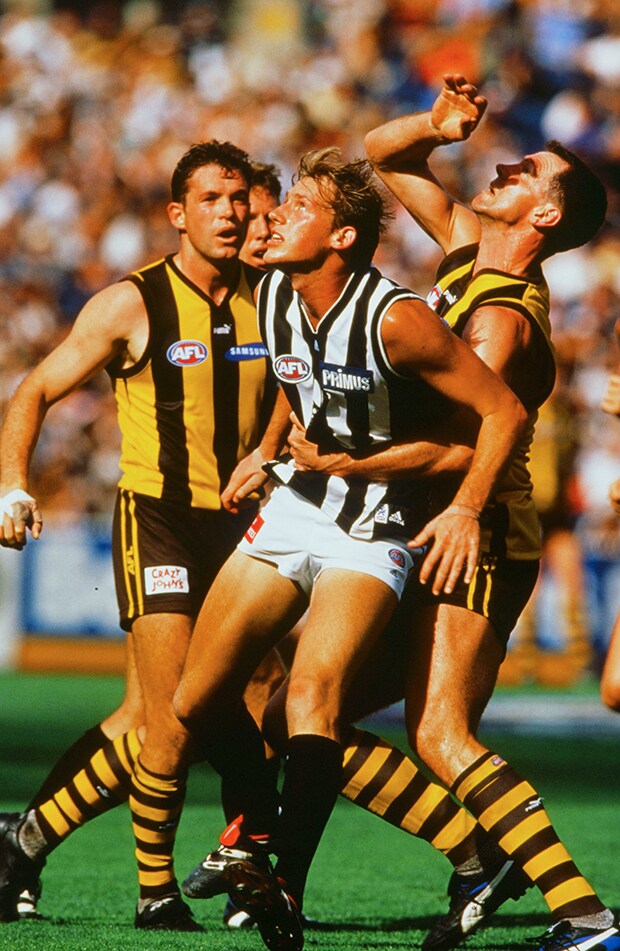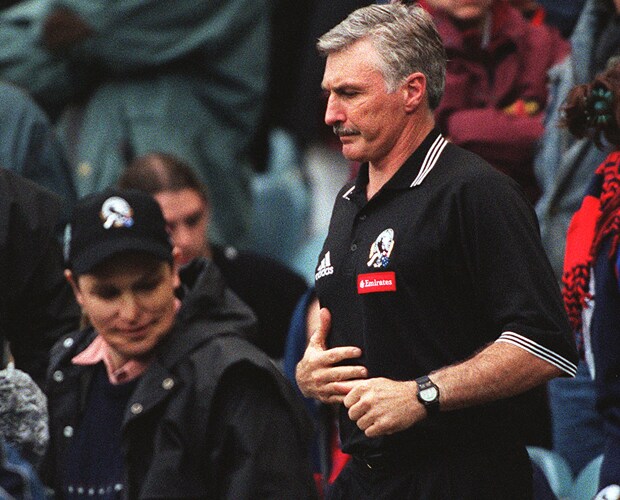Every match that Collingwood plays feels like it's the most important game in the world.
But the truth is that some games matter more than others. And some have impacts that last for decades, even if that significance isn't always apparent at the time.
So here is a trawl through the history books to come up with the most significant games in Magpie history. These aren't just the biggest wins or the most memorable days, but the games that had a significant influence on the club's history.
We've excluded all finals, simply because otherwise the list would almost be completely taken up with premierships and a few painful Grand Final losses. But the home-and-away games covered in this series have had a huge impact on the club – sometimes positively, sometimes negatively. They've led to club turmoil, coaches being sacked, major changes in the game or sometimes set us on the path to a flag.
Whatever the outcome, these games represent major turning points in our club's story. And they're worth recalling.
The start of something big: Round One 2000
Collingwood fans trudging home from the one-off, somewhat ill-fated 'Millennium Match' against Collingwood on New Year's Eve 1999 had to quickly re-calibrate their expectations heading into the 2000 season.
Just months after Mick Malthouse was unveiled in a Lexus amidst a blaze of publicity and hype as new coach of the Magpies - surely the worst kept 'secret' in footy - the team had been humbled in the unusual pre-season encounter.
A kid called Brendan Fevola kicked 12 goals for the Blues on a dismal night. It looked like being a long and difficult rebuild for Malthouse's side, which had finished on the bottom of the ladder only a handful of months earlier.
One of Malthouse's former players from Footscray, Brad Hardie, lashed out at his one-time coach, saying he had underachieved with West Coast: "His finals record since 1994 has been abysmal. I think Mick was found wanting ... over the past four or five years. I think the Eagles got out-coached by thinking men's coaches."
So you can understand the trepidation some Black and White devotees had when they went along to round one of the 2000 season - Malthouse's 379th game as a coach and his first in charge of the Magpies - fearful of what might happen in the Labour Day clash with Hawthorn.
As it turned, they shouldn't have been so concerned, and what transpired that exceptionally hot Monday afternoon (it was almost 35 degrees) gave a hint of what was to come under Malthouse.
That game, and what came beyond it, gave a template for the kind of football Malthouse's Magpies would undertake in the years ahead, culminating spectacularly at the start of the next decade.
That round one, 2000 game was a kicking off point to what would be a stunning Collingwood revival, a turnaround that happened faster than anyone - perhaps even Malthouse - could have imagined.
For Collingwood had finished rock bottom in 1999, in Tony Shaw's last season as coach, with the only compensation being the No. 1 pick in that year’s National Draft. The club chose teenage ruckman Josh Fraser, and much of the speculation leading into the Hawks' game centred on whether the youngster would make his debut or not.
Len Thompson, the club's 1972 Brownlow Medallist, reckoned the kid was ready.
Thompson had been 18 years and 22 days when he debuted in the 1965 Preliminary Final, and he was convinced Fraser - at 18 years and 68 days - was seasoned enough to immediately make his debut. In the lead-up to the game, Thompson said: "They (Collingwood) haven't got a ruckman; they've just been doing a patch-up job in the last few years. Why not develop one?'"
"This bloke is only going to improve. There's no real (physical) danger out there anymore. Playing in a lesser competition is going to be far more dangerous for him than playing for Collingwood."
Malthouse agreed.
Fraser was one of six players to play their first games with Collingwood that day. Two of them had played elsewhere - former Lion Shane O'Bree and ex-Bomber Andrew Ukovic. One of the other debutants was Damien Adkins.
Two of the other first-gamers, 18-year-olds Ben Johnson, a Magpie fan who had adored Gavin Brown, and Leon Davis, an exciting indigenous young talent from WA, would go on to become significant parts of the Collingwood revivals
"By the end of the season I hope we've played a lot more of our young blokes," Malthouse said that day. "Leon's done everything right and he embraces our game plan, so he's more than a good chance to play."

Josh Fraser battles for front position against Hawthorn's Paul Salmon during his debut game.
Collingwood was a $2.40 outsider to the Hawks' $1.55. A look at the respective experience of the teams showed why the bookies saw it that way. The Magpies' average age was 22 years and 323 days, almost three years younger than the Hawks. And Collingwood went into contest with 700 fewer games in terms of experience.
Collingwood made an immediate statement under Malthouse, kicking five goals to two in the opening term. Five more goals came in the second as Malthouse's young charges opened up a half-time lead of 33 points.
The third term saw the Magpies extend their lead, kicking seven goals to five, and the final margin was a decisive 54 points, with Collingwood kicking 20.20 (140) to Hawthorn’s 13.8 (86).
The Sun detailed of the Magpies' shock win: "Six new faces have injected individual skill and collective confidence into the once league powerhouse with outstanding debuts from wingman Damien Adkins, midfielder Shane O'Bree, forward Ben Johnson and defender Andrew Ukovic."
Adkins kicked the first goal of Collingwood's season in the opening minute of his AFL career before threading a second one through shortly after. Johnson kicked two of his own for the game, both in the third term, as the Magpies turned the screws on the Hawks.
O'Bree restricted reigning Brownlow winner Shane Crawford to only nine disposals for the game - a huge performance from the 20-year-old.
As Bruce Matthews said in the Sun: "It was that sort of puzzling day for Hawthorn when players took the public holiday to its literal meaning and went missing..."
Nathan Buckley was outstanding – as usual - having 31 disposals, and kicking 3.4, to take the three Brownlow votes; Anthony Rocca's four goals (including a long bomb from almost 70m) saw him take the two votes, while Ukovoic scored the one vote with 20 disposals.
Malthouse was pleased, but not getting carried away. He knew it was only a small step for the road ahead.
"It's a good step to have a very good win over a side that finished ninth," he said. "This is our first step ... to see if the players can maintain consistency.
“One of the joys of coaching is to coach a side that has some young fellows coming through, and hopefully today's the start of a long career for those boys."
He wasn’t wrong. Four of those six first-time Magpies would go on to play 200 games with the club. Matthews, too, would coach the club on 286 occasions.
Even President Eddie McGuire, the architect of much of this change, was playing it low-key after the match.
"We've had one win, it's as simple as that. One down, 21 to go," McGuire said. "What you need around a club is realists, not people who will tell you what you want to hear or hope to hear but people who will tell you what is actually going on, so that you can sit down and work things out.
"That's what we've done ... recruit people who tell it as it is. We're not hoping for the ghost of Jock McHale to come and save the day anymore."
The Magpies were on their way. They had a president and a coach with a plan. They were building a young, vibrant list, chasing bargains along the way, and looking to rebuild with solid foundations.
Collingwood would win the first five games of 2000. Then followed a stretch of nine consecutive losses. By season's end, Malthouse's team had won seven games, and had finished second bottom.

Mick Malthouse led Collingwood to five wins in his first five games in charge in 2000.
But by Malthouse's third year, in 2002, the Magpies would almost pinch a premiership, before going down to the one of the greatest teams of the modern era. They would play off in – and lose – another Grand Final the following year.
Grand Finals would also come in Malthouse’s last two seasons – 2010 and 2011 – closing out a very successful era for the club under one of the game’s best coaches.
Turning Points
Written by Glenn McFarlane and Michael Roberts
Turning Points: A game of belief.
Turning Points: The first game.
Turning Points: History's ugly repeat.
Turning Points: Honouring the greater good.
Turning Points: A turning point for football.
Turning Points: How we landed McHale.
Turning Points: Ending the Cat empire.
Turning Points: The practice match that led to a revolution.
Turning Points: Starting from the bottom.
Turning Points: Attacking the Cats.
Turning Points: The drama before the revival.
Turning Points: The loss that elevated Lethal.
Turning Points: The miracle of '58.
Turning Points: Whispers lead to coaching roars.
Turning Points: The break that felled Carman.
Turning Points: The Collier ban that cost dearly.
Turning Points: A Tassie turning point.


